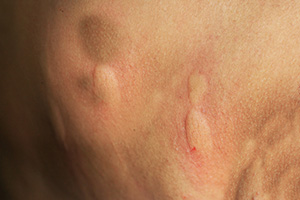When Is A Spider Bite Serious?
Portland OR - Beaverton OR - Lake Oswego OR - Vancouver WA

Spider bites, while often unpleasant, are typically not cause for major concern. Most of the time, a spider bite results in little more than a small, itchy bump that resolves on its own. However, there are instances where a spider bite can lead to more severe symptoms, necessitating medical attention.
Understanding the signs of a dangerous spider bite is crucial for knowing when to seek help and ensuring prompt treatment. Here’s what you need to know to tell when a spider bite is serious.
Dangerous Spiders In the Pacific Northwest
While it’s relatively rare to encounter dangerous spiders in the Pacific Northwest, it’s essential to be aware of their presence and potential danger. Even though these spiders may not be as common as in other regions, their bites can still pose a risk to human health. Here are some of the dangerous spider species found in Oregon:
- Black Widow: Black widow spiders are recognizable by their shiny black bodies and distinctive red hourglass-shaped markings on the underside of their abdomens. Their venom contains neurotoxins that can cause severe pain, muscle cramps, nausea, and in rare cases, even respiratory distress.
- Brown Recluse: Brown recluse spiders are light to dark brown in color and have a violin-shaped marking on their cephalothorax. Their venom contains cytotoxins that can lead to tissue necrosis (death of skin and tissue around the bite site), which may require medical intervention.
- Hobo Spider: Hobo spiders are often mistaken for brown recluse spiders due to their similar appearance. While their venom isn’t as toxic as it was once thought to be, hobo spider bites can cause localized pain, redness, and swelling, with some individuals experiencing systemic symptoms.
- Yellow Sac Spider: Yellow sac spiders are pale yellow to beige in color and are often found indoors. Their bites can cause localized pain and swelling, sometimes accompanied by systemic symptoms such as headache, nausea, and malaise.
- Wolf Spider: While wolf spiders are not generally considered dangerous to humans, their bites can be painful and may cause considerable swelling and redness. In rare cases, individuals may experience allergic reactions to wolf spider venom.
If you have any of these spiders on your property, it may be time to work with a professional spider exterminator. It’s also helpful to know that, for individuals who are prone to severe allergic reactions, spider bites can be even more severe—even if they don’t come from a species that’s considered dangerous.
Ready for pest service?
We'll call you! Leave your information below.
How To Treat A Spider Bite
Most spider bites, while painful, aren’t serious enough to warrant a trip to the emergency room. If you have a spider bite that isn’t showing severe symptoms, try following these steps to find relief:
- Clean the area with a mild soap
- Apply a cold compress or ice pack
- Consider taking ibuprofen or acetaminophen
- Refrain from scratching the bite
- Watch for worsening swelling, pain, or other symptoms
Signs Of A Serious Spider Bite
Spider bites can often be harmless, resulting in little more than a small, itchy bump. However, certain symptoms may indicate a more serious reaction. Here are few symptoms of spider bites that may need medical attention:
- Severe pain: If the pain from the bite intensifies and becomes increasingly unbearable, it could be a sign of a more serious reaction.
- Redness and swelling: While some swelling and redness are normal after a spider bite, if it spreads rapidly or becomes extensive, it may indicate a more severe reaction.
- Blistering or rashes: Some skin irritation is normal with any spider bite—and most insect bites in general. But, if the reaction starts to spread, blister, or otherwise seem unusual, see a doctor as soon as possible.
- Nausea or vomiting: If you begin to feel nauseous or experience vomiting after a spider bite, it could be a sign of systemic toxicity and requires immediate medical attention.
- Difficulty breathing: Breathing difficulties or tightness in the chest can be a sign of a severe allergic reaction, which necessitates immediate medical intervention.
- Muscle cramps or spasms: If you develop muscle cramps or spasms after a spider bite, especially if they’re persistent or severe, seek medical help promptly.
If you aren’t experiencing these symptoms but still believe your spider bite may be serious, it’s always better to err on the side of caution and speak with a doctor.
Tips For Avoiding Spider Bites
It’s almost impossible to completely avoid spiders, but that doesn’t mean you have to sustain a bite. Be cautious if spiders are nearby to avoid aggravating them; most species will leave you alone unless they feel threatened. Another way to avoid bites is to be careful when handling objects like firewood, cardboard boxes, or landscaping equipment. Most bites happen when people unknowingly reach into a web.
What To Do If You Have Spiders
If you’re concerned about spider infestations in your home or property, Summit Pest Management is here to help. Our professional pest control experts specialize in identifying and eliminating spiders and other pests to ensure your peace of mind. To get rid of spiders quickly, contact our team for help!
Back to Spider Exterminators – Control – RemovalWhen Is A Spider Bite Serious? in Portland OR & Vancouver WA
Serving Portland Oregon & Vancouver Washington
